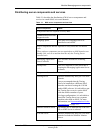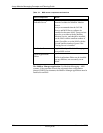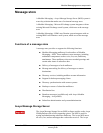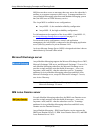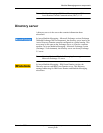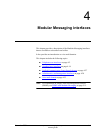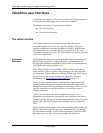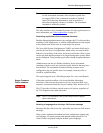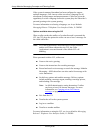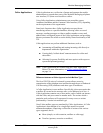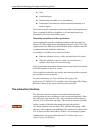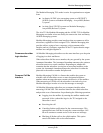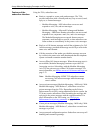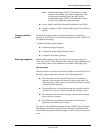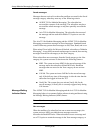
Modular Messaging interfaces
November 2004
Avaya Modular Messaging Concepts and
Planning Guide
4-3
Note: Avaya recommends that administrators set up the system to
use the Automated Attendant if the telephone system does
not support DID. If the Automated Attendant is disabled,
some Call Answering functionality, such as transfers to
subscriber telephones will not be available. The Automated
Attendant is enabled by default.
The caller interface can be extended by means of Caller Applications. For
more information, see Caller Applications
on page 4-5.
Scheduling capabilities of the Automated Attendant
Modular Messaging administrators can configure the TUI caller interface,
excluding Caller Applications, to exhibit scheduled behavior with respect
to the prompts that callers hear on connecting to the system.
The Voice Mail System Configuration (VMSC) tool on the MAS can be
used for the first level of configuration, which relates to recurrent daily
behavior. For each day of the week, the hours in which the office is open
can be specified and the prompts to be played during those specific hours
can be configured. These prompts greet callers during designated business
hours.
Administrators can also set Holiday schedules for the Automated
Attendant, which override any recurrent weekly behavior that may have
been defined. The Automated Attendant Holiday prompts can be
configured to play on specific dates, for example, when the office is
closed for a public holiday.
The system supports up to 18 holiday prompts for a voice mail domain.
Avaya Common
Caller Interface
Callers that reach the mailbox of an Avaya Modular Messaging
subscriber, either because the extension is busy or because there is no
response, are presented with the Avaya Common Caller Interface (CCI).
The CCI provides all callers with the same set of options, regardless of
the TUI assigned to the called subscriber.
Note: The CCI is presented if the system setup does not support
supervised transfer.
Selecting a language when leaving a Call Answer message
Messages that the caller leaves for a subscriber are known as Call Answer
messages.
If the system Automated Attendant has been configured to support only
one language, all system prompts and announcements played to Call
Answer callers are played using the default system language.



